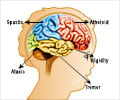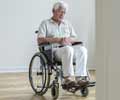Adults with cerebral palsy (CP) are at increased risk of developing depression and anxiety than adults who do not have cerebral palsy, reveals a new study.

TOP INSIGHT
Adults with cerebral palsy (CP) are more prone to depression and anxiety than adults who do not have cerebral palsy, reveals a new study.
Read More..
Those adults with cerebral palsy without an intellectual disability had a higher risk of developing depression and anxiety. The study relied on diagnostic codes for outcomes.
Adults with CP have an increased risk of depression or anxiety. In particular, these results indicate that this association is driven largely by those individuals with CP with no co-occurring ID.
Future work is needed in community-based samples to fully elucidate the causal mechanisms driving these associations.
Source-Eurekalert
 MEDINDIA
MEDINDIA




 Email
Email










